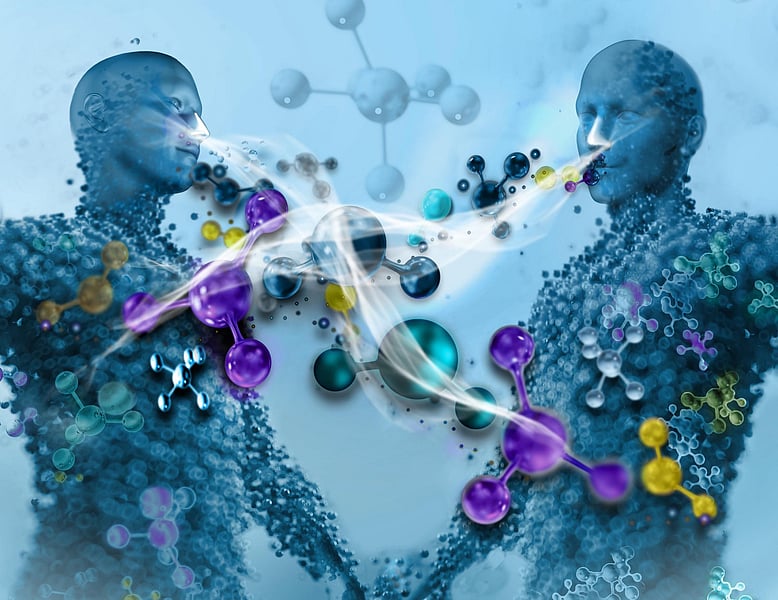Get Healthy!

- Amy Norton
- Posted June 24, 2022
Smells Like Friendship: Similar Body Odors May Draw Folks Together
You and your best friend may have your noses to thank in helping bring you together, a new study suggests.
Researchers found that pairs of friends who'd just "clicked" upon meeting tended to smell more alike, compared to random pairs of strangers. What's more, a high-tech electronic nose was able to predict, based on body odor, which strangers would hit it off during their first interaction.
The study was small, involving 20 pairs of "click" friends, but experts said it points to a simple fact: Sniffing is not only the realm of dogs, and humans do unconsciously use it in social interaction.
That's not to say people choose a lifelong bestie based on scent.
"But this does suggest there's a contribution of olfaction to forming friendship," said Valentina Parma, a researcher at Monell Chemical Senses Center in Philadelphia, who reviewed the findings.
Olfaction is the technical term for sense of smell. And relative to our other senses, Parma said, "we don't tend to think about our noses a lot."
After all, she noted, people routinely have their vision and hearing checked. "But," Parma said, "has a doctor ever checked your sense of smell?"
Yet it's clear that olfaction is more important in human bonding than people generally recognize. Newborns are a prime example, Parma said. While their vision is not yet sharp, their sense of smell is. And they prefer the scent of their mother, and her breast milk, above all others.
There is also evidence, Parma said, that romantic attraction has a smell component -- and not just whether you like your date's choice of cologne.
Forming a human friendship is much more complicated than sniffing someone out. People have language and take visual cues from facial expressions and body language. Folks also care about things like personality, values and beliefs, and opinions on movies and music.
But that does not mean we should discount olfaction in friendship, according to Parma: We have probably all met someone with whom we had instant "chemistry," and the nose may have played a part in it.
The study -- published June 24 in the journal Science Advances -- involved 20 pairs of friends, recruited through social media, where both agreed they'd hit it off upon meeting. Each participant gave a body odor sample by wearing a study-provided T-shirt for two consecutive nights -- after using study-provided soap and no other products on their bodies.
Researchers then used an electronic "nose" to analyze the T-shirt odors. Overall, they found, each participant's odor was more similar to his or her click friend's than to that of other study participants.
A separate experiment involved 17 strangers. There, the electronic nose was able to predict, with 71% accuracy, which people would immediately jell during a nonverbal game: That is, those with more similar smells were more likely to click.
Why might humans feel friendship connection based on smell?
Body odor is correlated with genetic makeup, and particularly immune function, said lead researcher Inbal Ravreby, a doctoral candidate at the Weizmann Institute of Science in Israel.
Her hypothesis, she said, is that "smelling others allows us to compare between their body odor and our own body odor, and by that we may have an indication to the degree of genetic similarity between us."
It's possible, Ravreby speculated, there was an evolutionary advantage to having genetically similar friends, where "by helping friends, we helped spread our own genes." But, she added, "alternative explanations are certainly possible."
It is hard to say how much value people put on their noses in forming friendship, according to Ravreby. But, she said, "I do think that body odor similarity may play an important role in our tendency to approach or avoid someone, and our tendency to click."
The findings could have implications beyond understanding human behavior, researchers say. One question is whether smell-based therapies could help ease the social impairments seen in autism spectrum disorder, for example.
Parma agreed that's a possibility. In her own research, she found that when children with autism were exposed to the scent of their mother, they were better able to imitate the actions of others -- a social ability that is often impaired in autism.
"I do think olfaction is not used clinically as much as it could be," Parma said.
The pandemic has cast a spotlight on olfaction, since many people with COVID lose their sense of smell, at least temporarily. Much of the research attention, Parma said, has gone toward finding treatments for prolonged smell loss -- which currently lacks options.
More information
The Dana Foundation has more on the sense of smell.
SOURCES: Inbal Ravreby, doctoral student, Department of Neurobiology, Weizmann Institute of Science, Rehovot, Israel; Valentina Parma, PhD, assistant director, Monell Chemical Senses Center, Philadelphia; Science Advances, June 24, 2022, online





